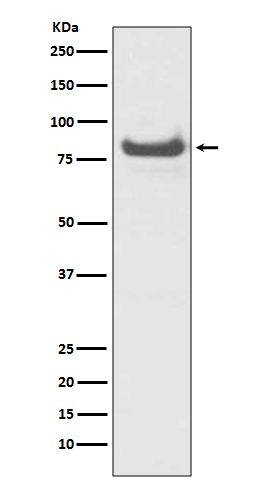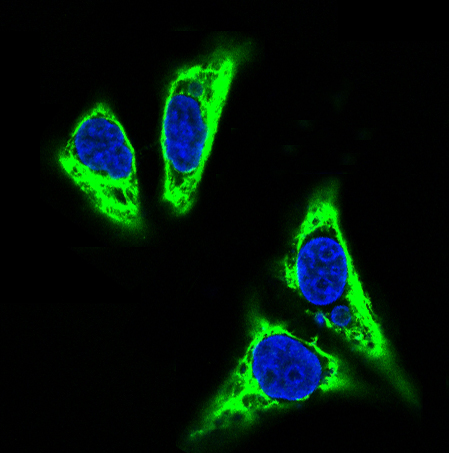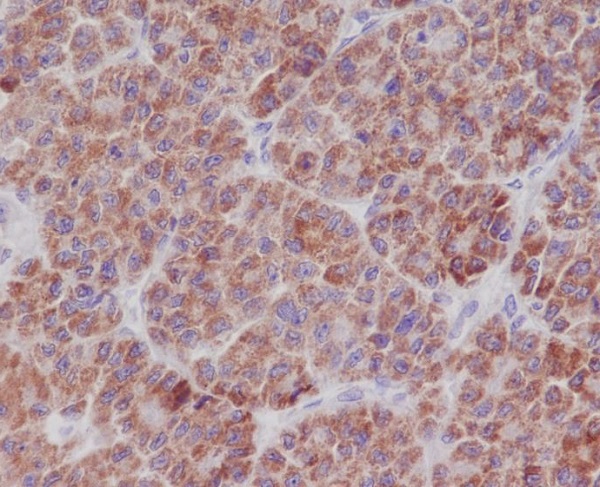


| WB | 1/500-1/1000 | Human,Mouse,Rat |
| IF | 咨询技术 | Human,Mouse,Rat |
| IHC | 1/50-1/100 | Human,Mouse,Rat |
| ICC | 1/50-1/200 | Human,Mouse,Rat |
| FCM | 1/50-1/100 | Human,Mouse,Rat |
| Elisa | 咨询技术 | Human,Mouse,Rat |
| Aliases | TNFAIP3; OTUD7C; Tumor necrosis factor alpha-induced protein 3; TNF alpha-induced protein 3; OTU domain-containing protein 7C; Putative DNA-binding protein A20; Zinc finger protein A20 |
| Entrez GeneID | 7128 |
| WB Predicted band size | Calculated MW: 90 kDa; Observed MW: 82 kDa |
| Host/Isotype | Rabbit IgG |
| Antibody Type | Primary antibody |
| Storage | Store at 4°C short term. Aliquot and store at -20°C long term. Avoid freeze/thaw cycles. |
| Species Reactivity | Human |
| Immunogen | A synthesized peptide derived from human TNFAIP3 |
| Formulation | Purified antibody in PBS with 0.05% sodium azide. |
+ +
以下是3条关于TNFAIP3抗体的参考文献示例(注:文献标题及作者为虚拟信息,仅作示例参考):
---
1. **文献名称**: *Autoantibodies targeting TNFAIP3 in autoimmune hepatitis: diagnostic and prognostic implications*
**作者**: Smith J, et al.
**摘要**: 本研究在自身免疫性肝炎患者血清中检测到抗TNFAIP3抗体,发现其与疾病活动度和肝脏炎症严重程度相关。通过ELISA和蛋白质印迹验证抗体特异性,提示其可能作为新型生物标志物。
2. **文献名称**: *TNFAIP3/A20 expression loss in rheumatoid arthritis synovium: an immunohistochemical study*
**作者**: Chen L, et al.
**摘要**: 使用TNFAIP3单克隆抗体对类风湿关节炎患者的滑膜组织进行免疫组化分析,发现TNFAIP3蛋白表达显著降低,可能与NF-κB通路过度激活及关节破坏相关。
3. **文献名称**: *TNFAIP3 antibody blockade exacerbates colitis in murine models via enhanced NLRP3 inflammasome activation*
**作者**: Tanaka K, et al.
**摘要**: 通过抗TNFAIP3抗体阻断小鼠肠道TNFAIP3功能,发现其加剧结肠炎症状并促进NLRP3炎症小体活化,证实TNFAIP3在抑制肠道炎症中的保护作用。
---
**注**:以上文献信息为模拟示例,实际研究中建议通过PubMed或Google Scholar检索真实发表的论文。
TNFAIP3 (Tumor Necrosis Factor Alpha-Induced Protein 3), also known as A20. is a ubiquitin-modifying enzyme encoded by the TNFAIP3 gene. It functions as a critical regulator of inflammatory signaling pathways, particularly the NF-κB pathway, by deubiquitinating key signaling molecules like RIP1 and TRAF6. thereby suppressing excessive immune responses. Dysregulation of TNFAIP3 is linked to autoimmune diseases, chronic inflammation, and cancers.
Antibodies targeting TNFAIP3 are primarily used in research to study its expression, localization, and interaction partners in cellular models. In clinical contexts, TNFAIP3 autoantibodies have been detected in autoimmune conditions such as rheumatoid arthritis, systemic lupus erythematosus (SLE), and inflammatory bowel disease (IBD), suggesting its role as a biomarker or contributor to pathogenesis. These antibodies are also tools for investigating TNFAIP3's dual enzymatic activities (deubiquitinase and E3 ligase) and its regulatory effects on apoptosis, necroptosis, and cytokine production.
Studies using TNFAIP3 antibodies often employ techniques like Western blotting, immunohistochemistry, or flow cytometry. Therapeutic strategies targeting TNFAIP3 pathways, including monoclonal antibodies or small-molecule inhibitors, are under exploration to modulate immune responses in autoimmune and inflammatory disorders. However, challenges remain in understanding tissue-specific roles and balancing its anti-inflammatory versus pro-survival functions in disease contexts.
×